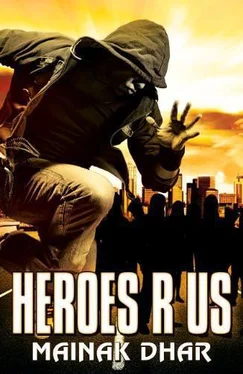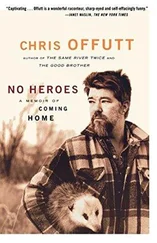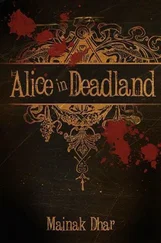They started climbing a set of winding stairs, as Rashid continued.
'For three weeks, I noticed nothing amiss. He would go out in the morning and come back late. He would keep to himself, and was no trouble to anyone. Then one day he came back looking really worried. He stopped going out and after a couple of days, I went to ask him if he was well. That's when he told me. Has Khan told you the story?'
'Only in brief. What is the full story?'
'Hear it from the horse's mouth."
With that Rashid knocked on a door at the top of the stairwell. It was opened on the second or third knock. As the door swung open and the three of them walked in, Arnab noted that the room was dark, with no lights on and the curtains drawn. Arnab saw a man huddled in the corner, and as the door opened, he got up and walked towards them. In the darkness, Khan still had not seen him, and when Arnab saw that the man was carrying a gun in his right hand, he stepped between Khan and the man, ready to disarm the man.
'Arif, relax. These are the friends I told you about. They are here to help you.'
The man seemed to relax a bit but kept the gun in his hand as he turned on a small table lamp. Arnab winced a bit as the light came on, but it was still dark enough for him to see clearly. He was young, perhaps barely out of his teens. He was clean-shaven, wearing jeans and a polo t-shirt and would not have looked out of place in a college campus. They sat down, Arnab and Khan on two small chairs and the young man on the bed in the far corner of the small room. He began speaking without any more pleasantries, as if he was keen to get what he had to say off his chest.
'My name is Mohammed Arif. I was born near Sopore in Kashmir. As I was growing up, many young boys would join the mujahids fighting Indian rule, but my parents insisted I focus on my studies. My father was closely linked to some of the mujahids. I never learnt the exact extent of his involvement, but he would disappear for days on end and always kept a gun at home. Then one day…'
He paused for a second before continuing.
'One day the Indian Police took my father away. We begged and pleaded, but we never saw him again. All we were told was that he was a terrorist. I was fifteen, and my heart was bursting with anger and a desire for revenge. One day I ran away from home and met an old friend who was rumoured to have links with people on the Pakistani side.'
Arnab and Khan were listening in silence, but Arnab was beginning to get impatient, wondering why he had been dragged here to listen to this young man's tale of woe. Arif noticed and held up a hand, as if to ask Arnab to wait.
'They trained us in a camp on the Pakistani side of the border. Basic infantry skills, weapons handling, explosives. The basic stuff. After two months, they started sending us across the border on raids. We were scared shitless, and most of us lost our minds the first time the Indian Army fired at us, but those that survived learned fast. Of the eight of us in my class, three never survived the first week. The five who survived were one day called by the camp commander, who said he had a guest who wanted to talk to us.'
Arnab was listening in silence, but he could feel Khan tense up next to him. Khan had served two tours of duty in Kashmir, and meeting someone, who from the account so far, was one of the terrorists he had killed and lost friends to, brought back uncomfortable memories.
'The man was an Afghan whose name I don't know, but he told us there was a big mission to be launched deep in India, to strike at the heart of the Indian government. I volunteered, hoping to get some real action. We were infiltrated into India and sent to Delhi, where we were asked to lay low for the next few weeks till we were contacted. I was beginning to get bored when a meeting was called. There were the five of us, and three men I didn't know, who seemed to be Afghans or Pashtuns. Their leader was a scary son of a bitch, and told us that the five of us would have to cover them in the mission, and neutralize anyone who got in their way.'
'We began drills, meeting in a new location each time, and we were looking forward to the action, though we had no idea what the mission was. I thought it was to attack some Army or government building, since the Afghans kept talking among themselves about entry routes and neutralizing guards.'
Arnab had so far said nothing but now interrupted.
'Look Arif, I don't know what you want from me, but give me one reason why I shouldn't just bust you now and haul you to the police as a terrorist.'
Arif looked at Arnab and smiled, 'Because I can help prevent many people from being killed.'
'And why would you do that? Or does a cold blooded killer suddenly develop a conscience?'
Arif didn't take the bait, and stayed calm as he replied.
'My fight was with the Indian police and government, and all I wanted to do was to avenge my father. I've never killed a civilian and had no intent of doing so. A few days ago, I overheard the Afghans talking about the mission. I didn't catch everything, but I did hear one of them mention blast damage, and the other say something about likely civilian casualties being in the thousands. That's when I knew this mission was more than just an attack on a government or Army installation and I bolted.'
Arnab asked him why he hadn't gone to the Police.
'Are you crazy? They would kill me and with just the information I have, they wouldn't be able to do much about the attack. Plus, as I said, I have no love for the Police, but I thought I could help prevent a massacre of innocents.'
Arnab looked at Khan to see if he had any ideas, but the old man shrugged his shoulders.
'Look Arif, I can't do much with what you have. I need more information. Where are they planning to attack, when, what is the nature of the plan? Without that, I can't do much either. Why don't you join your friends again and find out more?'
Arif shook his head.
'It's too late for that. I was scared and ran. Now I'm sure they suspect that either I've chickened out, or worse, that I've changed sides. Those Afghans are cold-blooded killers. They won't bother asking where I was, they'll probably just kill me to be sure'
'Then what's the point of calling us? What do you expect me to do?' Arnab asked in exasperation.
'I've read the papers. I know you are special. I know that you could stop them. I can get more information but don't know how to pay for it.'
'Pay?' Arnab didn't know what he meant.
'I asked around, checking with old mates still in Kashmir, and one of them has contacts in Pakistan who may know more. But in our line, as in anything else nowadays, money talks. His contacts want ten million Rupees to get the information. For all I know, my mate is taking his cut, but that's what he told me.'
'You stupid bugger, where do you think we can get that much money from?' Khan exploded.
As Khan and Arnab left, Arnab was deep in thought. On the way back home, Khan sensed his contemplative mood.
'Arnab, are you thinking of how the hell we could arrange that ridiculous sum of money?'
Arnab just nodded. In fact, he was thinking about the quandary in which he now found himself. On the one hand, he could just forget this meeting had ever happened, and get on with his life. Take up the bank job, start a settled life, get married someday, have a family-all the things his mind told him he should focus on. Or he could embark on this crazy crusade, which may be nothing more than a wild goose chase, and re-enter the world he had vowed never to enter again.
As for the money, it was the least of his concerns. He knew where he could get that kind of money. The question was, whether he was willing to pay the price needed to get it?
When they got back to Arnab's apartment, it was past midnight, and Arnab had said no more than a couple of sentences during the one and a half hour journey. Khan could sense just how agitated Arnab was, and did not try and bring up the evening's meeting till Arnab was ready. At one level, Arnab was furious with Khan for having dragged him back to a side of his life that he wanted to leave for good. At another level, he realized that it was silly to blame Khan. The old man had just done what anyone else in his position would have considered the right thing to do. It was not Khan's fault, but that did not make the dilemma he faced any easier to deal with.
Читать дальше












